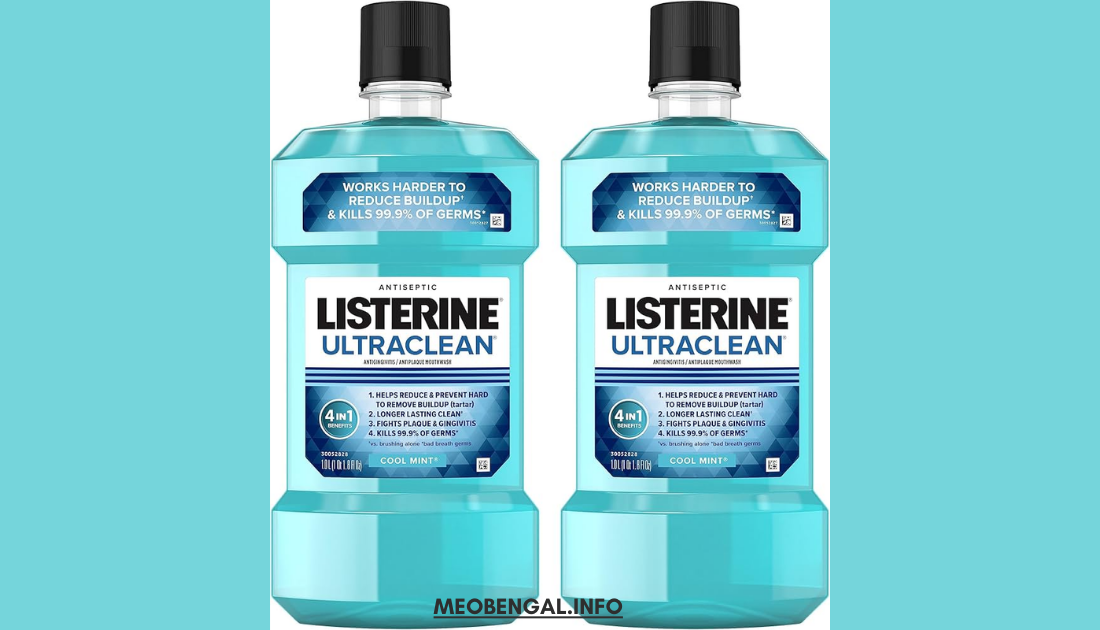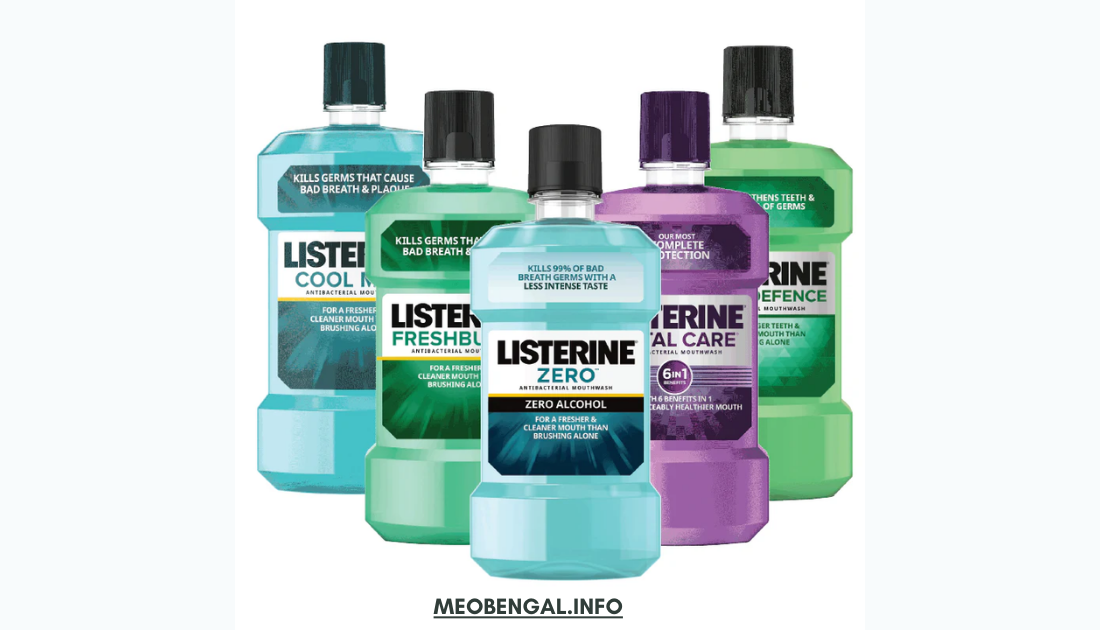Listerine mouthwash is a staple in oral care routines worldwide, known for its effectiveness in promoting fresh breath, reducing plaque, and fighting germs that cause gum disease. With a variety of options tailored to different needs, Listerine offers solutions for those seeking comprehensive oral hygiene. In this guide, we’ll dive into the benefits of Listerine mouthwash, its different types, and tips for making the most of it in your daily routine.
1. Why Choose Listerine Mouthwash?
Listerine mouthwash has been a trusted brand for over a century, recognized for its powerful antiseptic properties and its ability to enhance oral health. Unlike brushing and flossing alone, which can leave bacteria behind, Listerine is designed to reach areas that may be missed, providing a deeper clean. Its formula contains essential oils like thymol, menthol, and eucalyptol, which target bacteria, freshen breath, and support gum health.
If you’re looking to add an extra layer of protection to your oral hygiene routine, Listerine mouthwash is a reliable choice. It addresses common issues such as bad breath, plaque buildup, and gum inflammation, making it an essential addition for anyone seeking complete oral health.
2. Key Benefits of Using Listerine Mouthwash
Listerine mouthwash offers several benefits that go beyond just freshening your breath. Here’s how it supports overall oral health:
a. Fights Plaque and Gingivitis
Listerine’s antiseptic properties help reduce plaque buildup, a major cause of gum disease. Regular use prevents plaque from hardening into tartar, which can lead to gingivitis and periodontal disease. By disrupting the bacteria that contribute to plaque, Listerine supports healthier gums and teeth.
b. Reduces Bad Breath
Listerine is known for its ability to freshen breath instantly. The essential oils in its formula neutralize the bacteria that cause bad breath, providing long-lasting freshness. Whether it’s used before a meeting, a social event, or just to start the day, Listerine mouthwash keeps breath fresh for hours.
c. Helps Prevent Cavities
Certain Listerine products contain fluoride, which strengthens tooth enamel and helps prevent cavities. By reinforcing the enamel, Listerine adds an extra layer of protection against decay, which is especially beneficial for individuals prone to cavities.
d. Provides a Deeper Clean
Brushing and flossing are essential, but they may not reach every part of your mouth. Listerine mouthwash targets areas between teeth and along the gum line, where bacteria can hide. This extra step ensures a cleaner mouth, lowering the risk of oral health issues.
e. Supports Overall Oral Health
Using Listerine mouthwash as part of your daily oral care routine supports a balanced oral microbiome. This balance is crucial for keeping harmful bacteria in check and promoting a healthy mouth environment, which can positively impact overall health.
3. Types of Listerine Mouthwash
Listerine offers various mouthwashes tailored to different oral health needs. Here are some of the most popular options:
a. Listerine Cool Mint Antiseptic
Listerine Cool Mint is a classic antiseptic mouthwash that effectively kills 99.9% of germs. It’s known for its bold minty flavor, which leaves breath feeling fresh. This variant targets plaque and gingivitis, making it ideal for those looking to maintain overall gum health.
- Best For: General oral health, fresh breath, and gum protection.
- How to Use: Rinse for 30 seconds twice daily after brushing and flossing.
b. Listerine Total Care
Listerine Total Care offers six benefits in one bottle, providing all-around oral health support. It contains fluoride to strengthen enamel, protects against cavities, reduces plaque, and freshens breath. This multi-benefit mouthwash is great for those seeking comprehensive oral health protection.
- Best For: Cavity prevention, plaque control, and overall oral health.
- How to Use: Rinse with 20ml for 30 seconds twice daily.
c. Listerine Zero Alcohol
For those who prefer a milder taste, Listerine Zero Alcohol is a gentler option that still provides effective germ-fighting benefits. It’s alcohol-free, making it suitable for people with sensitive gums or anyone looking for a less intense flavor. This mouthwash provides fresh breath and fights bacteria without the burn of alcohol.
- Best For: Sensitive mouths, fresh breath, and general oral hygiene.
- How to Use: Rinse with 20ml for 30 seconds twice daily.
d. Listerine Healthy White
Listerine Healthy White is designed for individuals looking to brighten their smile. It contains peroxide to remove surface stains, providing a whitening effect over time. Additionally, it freshens breath and kills germs, offering the same benefits as traditional Listerine products while enhancing tooth brightness.
- Best For: Teeth whitening, fresh breath, and reducing surface stains.
- How to Use: Rinse for 60 seconds twice daily for visible results.
e. Listerine Naturals
Listerine Naturals uses a formula that’s 99% naturally derived, with no artificial flavors or dyes. It’s alcohol-free and still provides effective germ-killing benefits. This option is ideal for those who prefer natural ingredients while still maintaining a high level of oral hygiene.
- Best For: Natural product enthusiasts, sensitive mouths, and fresh breath.
- How to Use: Rinse with 20ml for 30 seconds twice daily.
4. How to Use Listerine Mouthwash Effectively
To get the most out of Listerine mouthwash, follow these steps:
- Brush and Floss First: Listerine mouthwash works best when used after brushing and flossing. Brushing removes plaque on the teeth, while flossing clears food particles and bacteria between teeth, ensuring your mouth is prepared for a deeper clean.
- Measure the Correct Amount: Use 20ml of Listerine (about 4 teaspoons) for each rinse. Using the correct amount ensures you’re getting enough product to effectively target bacteria.
- Swish for 30 Seconds: Swish the mouthwash around your mouth for at least 30 seconds. Focus on reaching all areas, including the gums and the back of the mouth. This helps kill bacteria in hard-to-reach areas.
- Avoid Rinsing with Water Afterward: For the best results, avoid rinsing your mouth with water immediately after using Listerine. This allows the mouthwash to continue working and prevents dilution of its active ingredients.
5. Tips for Incorporating Listerine Mouthwash into Your Daily Routine
Using Listerine mouthwash regularly can significantly improve your oral health. Here are some tips to make it a habit:
- Keep It Visible: Place your Listerine mouthwash in a visible spot by the sink as a reminder to use it daily.
- Set a Routine: Use mouthwash at the same times each day, such as after brushing in the morning and before bed.
- Follow Up with Water: After the mouthwash has had time to work, drink water to stay hydrated and keep your mouth moist, especially if using an alcohol-based product.
- Use Before Social Events: Swish with Listerine before social gatherings for added confidence and long-lasting fresh breath.
6. Is Listerine Mouthwash Right for You?
Listerine mouthwash is suitable for most people looking to enhance their oral hygiene. However, certain factors should be considered:
- Sensitive Mouths: If you have sensitive gums or prefer a milder flavor, consider using Listerine Zero Alcohol. It’s gentler yet effective at freshening breath and killing germs.
- Dental Work: If you have specific dental work, such as crowns or fillings, consult your dentist on the best type of mouthwash for your needs.
- Children: For children under 12, use caution with mouthwash, as swallowing it can lead to stomach discomfort. Listerine offers kid-friendly options that are alcohol-free and safe for younger users.
7. Frequently Asked Questions About Listerine Mouthwash
Q: Can Listerine mouthwash replace brushing and flossing?
A: No, Listerine mouthwash should be used as an addition to brushing and flossing, not a replacement. Brushing and flossing remove plaque and food particles, while Listerine targets bacteria in hard-to-reach areas.
Q: How often should I use Listerine mouthwash?
A: For best results, use Listerine mouthwash twice daily, ideally in the morning and evening.
Q: Is it safe to use Listerine mouthwash every day?
A: Yes, Listerine is designed for daily use. However, if you experience irritation, consider an alcohol-free version or consult your dentist.
Conclusion
Listerine mouthwash is a powerful ally in maintaining oral health, with benefits that extend beyond fresh breath. From fighting plaque and gingivitis to supporting overall gum health, Listerine offers a range of mouthwashes to meet diverse needs. With regular use, it can improve your dental hygiene routine, giving you a cleaner, healthier mouth and added confidence.

